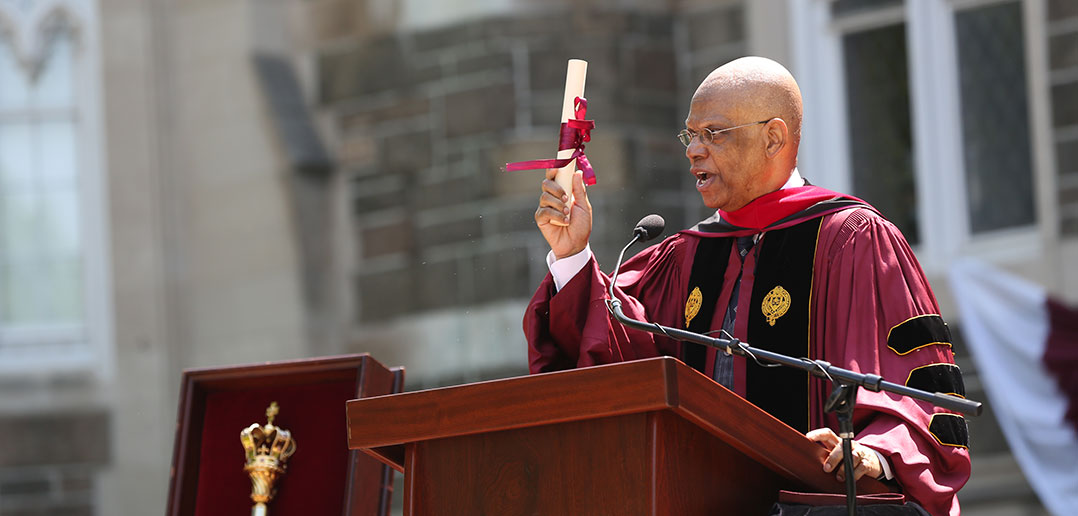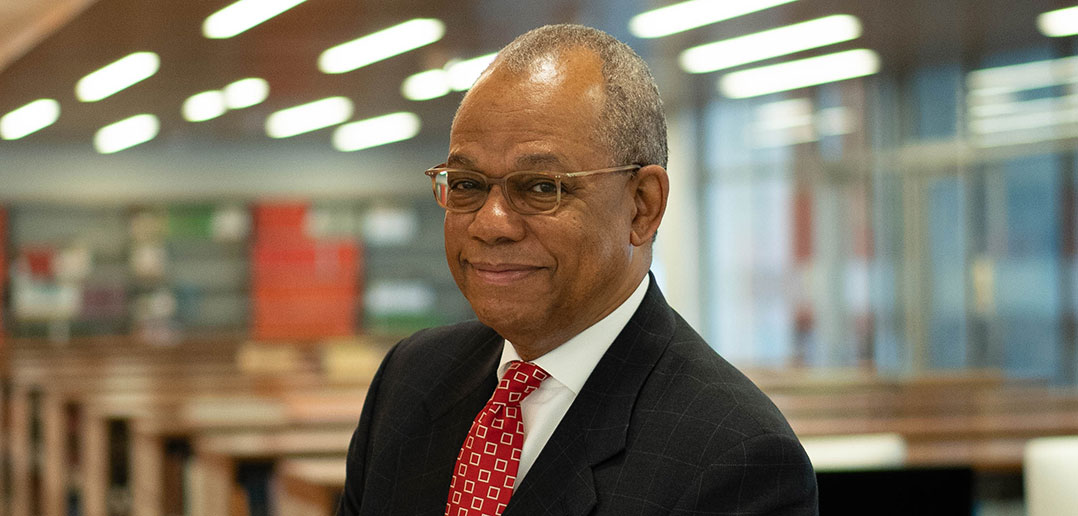The Rev. Dr. Calvin O. Butts, III, longtime pastor of Harlem’s historic Abyssinian Baptist Church, influential civil rights leader, and recent Fordham commencement speaker and honorary degree recipient, died at home in the early morning of Oct. 28. The cause was pancreatic cancer. He was 73.
“Fordham joins the people of New York City, and especially the congregants of the Abyssinian Baptist Church, in mourning the passing of the Reverend Dr. Butts,” said Tania Tetlow, president of Fordham. “For more than three decades he was not just the pastor of Abyssinian, but a spiritual and moral leader for New Yorkers and people around the world. Dr. Butts leaves behind a lasting legacy of education, civil rights, and community building. The Fordham community offers its profound condolences to Dr. Butts’ family, friends, and the congregation of the Abyssinian Baptist Church.”
Dr. Butts occupied a special place within the Fordham community. When the University returned to an in-person commencement ceremony this May after a three-year COVID hiatus, it was Dr. Butts who spoke to the assembled crowd of 16,000. In a rousing address, he told graduates that their Fordham education is transformative—a tool to help turn them into leaders of great character.

“One of the great things about character is that it teaches us to nurture our love for beauty. It teaches us to endure to the end, it teaches us to have courtesy for the other,” said Butts, who received an honorary doctorate of divinity at the ceremony. “I don’t mean just opening a door and tipping your hat—I mean recognizing that all men and women are brothers and sisters in this world.”
Fordham’s relationship with Dr. Butts began in the 1970s when he joined the University as an adjunct professor who taught a course in the history of the Black church in America. In the fall of 2021, he was appointed a distinguished visiting professor in support of the Graduate School of Education’s Center for Catholic School Leadership and Faith-Based Education.
Fordham alumna Marlene Taylor-Ponterotto, a medical provider in Harlem, recalled taking Dr. Butts’ class on Black church history in 1975 and reflected on his influence on her throughout her career.
“As a freshman it was one of my first courses, and it inspired me to fully understand the importance of spirituality and how it impacted the lives of African Americans. This message has stayed with me always as I grew to understand how significant his words were,” said Taylor-Ponterotto, who graduated from Fordham College at Rose Hill in 1979. “I am an HIV specialist and when I saw his involvement in the village of Harlem, where I practice now, ensuring that funds and more were in place for these patients, I was again reminded of his wisdom. He will always be one of those professors who taught me valuable lessons which I use each day in my practice.”
Last June, at Dr. Butts’ invitation, Joseph M. McShane, S.J., president emeritus of Fordham, preached at Abyssinian. In his sermon, Father McShane called Dr. Butts “a man for whom the biblical statement ‘Behold, he does all things well’ seems to be tailor-made.”
“He is the kind of preacher whom other preachers don’t only listen to. No. They study the transcripts of his sermons, all of which are nothing less than master classes in the art and craft of preaching,” Father McShane said. “Dr. Butts never tires of reminding us rightly that faith and education together form a modern-day cradle of civilization and the true source of both liberation and redemption.”
Butts delivered powerful sermons for more than 30 years at Abyssinian, focusing on the church’s core values of worship, evangelism, service, and education. He founded and chaired the nonprofit Abyssinian Development Corporation, a community-based organization responsible for over $1 billion in housing and commercial development in Harlem, and was instrumental in establishing the Thurgood Marshall Academy for Learning and Social Change—a public, state-of-the-art, intermediate and high school in Harlem.
A native New Yorker, Dr. Butts graduated from Morehouse College in 1972 and earned his Master of Divinity and Doctor of Ministry degrees from Union Theological Seminary and Drew University, respectively.
From 1999 to 2020, he served as president of the State University of New York (SUNY) at Old Westbury, one of the most racially and ethnically diverse schools in the SUNY system. His leadership led to the college’s largest enrollment ever, the addition of full-time faculty, and the expansion of student support services. The school earned new accreditations and created its first-ever graduate programs during his presidency. He also oversaw the college’s investment of approximately $200 million in capital projects. During his tenure, SUNY at Old Westbury received the Higher Education Excellence in Diversity Award from INSIGHT Into Diversity magazine for 2018, 2019, and 2020.
Dr. Butts’ unshakable belief that education and faith are intertwined was evident when he spoke to the Fordham community from the Terrace of Presidents at Commencement; in his address, he declared that the two are “the Tigris and Euphrates of our redemption, twin rivers at the source of our liberation.”
“Education ought to improve your character, education ought to help you increase your knowledge, and education ought to help you earn a living,” he said.
And while Dr. Butts lamented that “earning and living on the top” has become more popular than “development of character,” he expressed hope that Fordham students will reverse the trend.
“We are tomorrow. You are tomorrow,” he said. He told the graduates that they were examples of those who put character first and that they “represent the hope for America.”
Despite the challenges faced in this country, he said, education is “the tool that will help you to press our nation forward: backward, never; forward, ever.”

